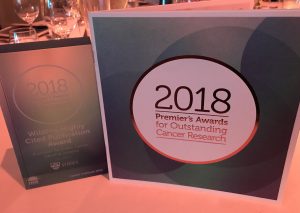On Friday the 3rd of November the NSW Cancer Institute held the 2018 Premiers’s Awards for Outstanding Cancer Research. An event attended by over 300 of the states top researchers and clinicians, and a chance to showcase and reward some practice changing research that is impacting the lives of cancer patients in this country. The APGI was the proud recipient of the 2018 “Wildfire Award“- an award that recognizes a Highly Cited Publication- a piece of research that has had global impact and is considered a landmark study in its field. The prize was awarded for our 2015 Publication in the worlds top science journal Nature– Whole genomes redefine the mutational landscape of pancreatic cancer.This study was the most thorough analysis of Pancreatic Cancer to date involving a global collaboration using cutting edge DNA sequencing technologies and analysis methods. The first author is Dr Nic Waddell from QIMR Berghofer in Brisbane, and senior authors Professor Sean Grimmond from the University of Melbourne and Professor Andrew Biankin form the University of Glasgow.
Previously, only a small portion of the genetic make-up of pancreatic tumours had been examined (known as the ‘exome’), which makes up about 1% of the genome. This study looked at the whole genetic make-up of a cohort of 100 patients’ tumours – and provided a detailed map of their tumour’s entire genomic structure. It was revealed that tumours have “unstable regions” hidden in their genomes, and that these unstable regions may be targeted by an existing class of chemotherapy drugs used to treat breast cancer. This drug class known as platinum therapies damage tumour DNA, and have been responsible for enhanced survival in subtypes of other cancers such as breast and ovarian cancer.These platinum therapies are underway in clinical trials in Pancreatic Cancer in the UK and the USA.
The impact of this work is amplified due to the data from this study being made freely available to researchers via the International Cancer Genome Consortium (ICGC). This is important as it allows researchers access to large data sets to study straight away, and has enabled hundreds of new pancreatic cancer studies all over the world.
We thank all the patients and their families for trusting us and participating in our research. You have made this possible. You trusted us and welcomed our research into your lives at a time of darkness. We also thank our funding bodies for supporting this work, and for everything you do for Pancreatic Cancer. Thank you to the Avner Pancreatic Cancer Foundation, The NSW Cancer Institute and the NSW Cancer Council who believed in the power work from the very first day.
We wont give up. Together we are changing the outcome trajectory of this disease.

